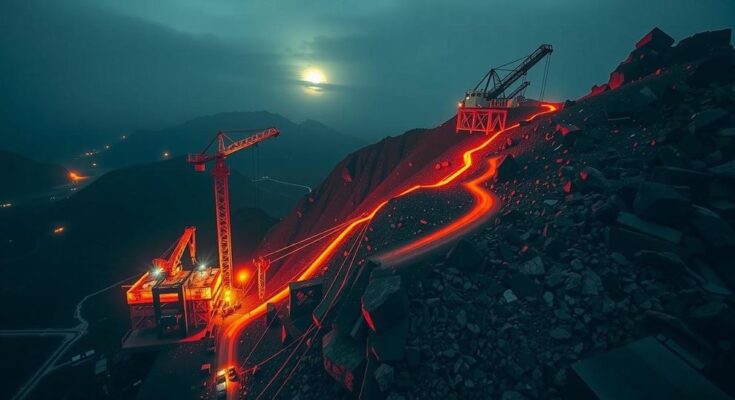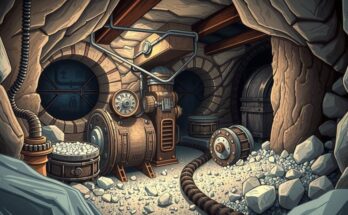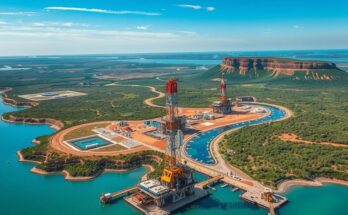The Republic of Congo aims to diversify its economy by enhancing investments in development minerals, which include key materials for infrastructure. Current production levels are under-utilized, representing a strategic opportunity for growth. The government plans major projects that will energize the sector, such as the Sounda Dam and a bulk cargo port. Expanding the mining sector’s potential and fostering collaboration among stakeholders is critical to achieving economic resilience and energy access.
The Republic of Congo is actively working to diversify its economy by reducing its dependency on the oil sector and enhancing investments in the mining industry. The development minerals sector, which encompasses vital materials such as sand and gravel, presents a largely untapped opportunity for bolstering infrastructure and advancing construction projects. Effective organization and sustainable management of these resources could significantly contribute to the country’s GDP and promote enduring economic growth, ultimately advancing the overall mining sector.
Currently, the artisan reliance on development minerals is not being fully harnessed, despite the sector’s substantial economic potential. Research conducted in 2024 by the Congolese government in collaboration with the United Nations Development Program (UNDP) indicates that the current production levels of sand and rubble, at 113,498 m³ and 86,984 m³ respectively, are inadequate when considering their capacity to enhance Congo’s economic output. This discrepancy identifies a strategic opportunity for investment in the sector.
Development minerals are critical for infrastructure projects, facilitating the construction of roads, bridges, and various public facilities. They further contribute to the energy sector by aiding energy production, site development, and hydrocarbon transportation. The Congolese government is committed to enhancing its energy sector and aims for universal energy access by 2040, exemplified by its recent initiatives.
In November 2024, plans were approved for the €2 billion Sounda Dam project, which is set to commence construction in January 2025, with an anticipated electricity generation capacity between 600 MW and 800 MW. Additionally, a €150 million bulk cargo port project designed to bolster industrial activities in the Pointe-Noire Special Economic Zone has been greenlit. Furthermore, there are plans for a railway bridge to connect Brazzaville and Kinshasa, facilitating the yearly transit of over 5 million passengers and 3 million tons of goods, thus solidifying its importance as a regional corridor.
Moreover, the Republic of Congo and Russia have agreed on constructing an oil pipeline connecting key locations including Pointe-Noire, Brazzaville, and Oyo. By improving the structured production of sand and stone, as suggested in the UNDP study, the country could reduce infrastructure expenses while promoting the sustainable use of its resources. Training artisan miners and modernizing equipment can enhance productivity and advance economic diversification, which is instrumental in fostering socioeconomic development and improving energy access.
The Republic of Congo holds a wealth of untapped resources beyond development minerals, including iron ore, copper, gold, and potash. The Mbalam-Nabeba iron ore project, led by Australian firm Sundance Resources, began technical constructions in November 2024, while the Mayoko project, operated by Congolese firm Sapro, successfully yielded its first 800 tons of iron ore in August 2024. Notably, the feasibility study from the Zanaga iron ore project indicates a positive prospect for iron ore production, aiming to achieve an annual output of 30 million tons.
To leverage these opportunities for sustainable growth, the forthcoming Congo Energy & Investment Forum scheduled for March 25-26 in Brazzaville will serve as a significant platform for stakeholders to discuss investments and collaborations focusing on infrastructure and mining projects. This forum is strategically important for positioning the Republic of Congo as a major force in Africa’s economic transformation.
The Republic of Congo is highly dependent on its oil sector, which poses risks due to fluctuating prices and sustainability concerns. The government recognizes the need to diversify its economy to create more stability and resilience, with a particular focus on developing the mining sector. The development minerals industry offers substantial potential to support infrastructure development and economic growth. This shift is further supported by the Congolese government’s commitment to energy accessibility and infrastructure enhancements that align with national and regional development goals.
In conclusion, the Republic of Congo stands at a pivotal juncture in its economic development as it seeks to diversify away from an oil-dependent economy towards enhanced investment in the mining sector. By capitalizing on its abundant development minerals, the country can significantly increase its GDP contributions, foster long-term economic growth, and promote infrastructure advancements. The collaborative efforts between the government and international partners, including the upcoming Congo Energy & Investment Forum, present essential opportunities for stakeholders to engage in transformative projects that will drive Congo’s sustainable economic future.
Original Source: energycapitalpower.com




